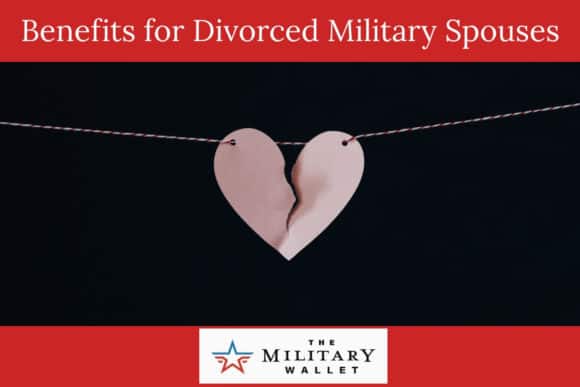Table of Contents
You’ve recently divorced your spouse or are going through a divorce, and now you’re searching for information. Divorce can be complicated, and one of your top questions is: “Do divorced military spouses qualify for any benefits?”
Military divorces can be an emotionally taxing time, and a bit more complex than civilian divorces. It’s understandable to be concerned about the benefits you may be losing, and the servicemember may be concerned about how a divorce will impact his or her pay. The Military Wallet is here to help break down what benefits divorced military spouses qualify for — from medical benefits, retirement benefits, etc. — Keep reading to learn more.
Divorced Military Spouse Benefits — Understanding the 20/20/20 and the 10/10 Rules
Military spouses who get divorced could be entitled to different benefits under Tricare, retirement pay, and more if they meet certain criteria.
There are two general rules for receiving benefits after divorce — they fall under the 20/20/20 rule and the 10/10 rule.
20/20/20 Rule for Divorced Military Spouses
The 20/20/20 rule for military spouses touches on benefits that a military spouse may be entitled to even if they are no longer a dependent of a military member. These benefits include:
- Tricare health benefits
- DoD military ID card
- The ability to shop at the commissary and exchange
- Certain military discounts
The 20/20/20 Requirements state that you must be:
- 20 years married
- 20 years of service that is eligible for retirement pay, and
- An overlap of marriage and military service of 20 years
- The spouse has not remarried. 20/20/20 benefits cease if the ex-spouse remarries.
If the criteria are met, the ex-spouse can receive Tricare for Life benefits.
Tricare Coverage Under the 20/20/20 Rule
To keep coverage under Tricare, the former (unmarried) military spouse must register with Tricare under their name and social security number, not your former married name or ex-spouse’s name. It requires the following documentation:
- Original marriage certificate
- Proof of military service/military retirement
- Divorce decree
There are also some exceptions to the 20/20/20 requirements, the 20/20/15 requirement.
To be eligible for the 20/20/15 rule, similar to the 20/20/20 rule, the military member must have served 20 years, the marriage lasted 20 years, but only 15 of those years need to overlap the time of service.
Under the 20/20/15 requirements, non-remarried spouses may receive Tricare benefits for up to one year after the official date of the end of the marriage.
The 20/20/15 rule does not apply to military ID cards, commissary, or exchange privileges.
10/10 Rule for Divorced Military Spouses
Now is a great place to note that if you are going through, or considering a divorce, it’s crucial that you understand the Uniformed Services Former Spouses’ Protection Act (USFSPA).
This federal law enacted in September 1982, recognizes the rights of a court to administer retirement pay to a former partner.
The USFSPA allows for a method of enforcing:
- Payments through the Department of Defense — if a court awards a portion of the military member’s retirement pay to an ex-spouse.
- Court-ordered child support; or
- Court-ordered alimony
What’s this have to do with the 10/10 rule?
The 10/10 rule comes into play by stating that the former spouse can receive a court-ordered portion of military pay from the Defense Finance and Accounting Service (DFAS) if:
- They’ve been married for 10+ years, and
- The service member performed at least 10 years of service creditable towards retirement during their marriage
The 10/10 rule can be confusing to understand. It does not delegate whether a former military spouse is eligible to receive a retirement check, only who sends it.
For more information on the 10/10 rule or how/when courts decide dividing a military member’s pension is necessary, click here.
Other Military Spouse Benefits After Divorce
Post-9/11 GI Bill
The Post 9/11 GI Bill provides military members, or their family members, with up to $160,000 of college benefits. Suppose a former military spouse is an eligible beneficiary at the time of the divorce, AND the military member agrees to share the benefits. In that case, the ex-spouse may have access to these benefits.
However, under federal law, court systems are not permitted to order the division of these benefits.
Continued Health Care Benefit Program (CHCBP)
Although Tricare for Life is not available for all former spouses, they do provide those who have not remarried with this transitional health insurance in order to bridge the gap between military medical coverage and civilian medical coverage. This program is called the Continued Health Care Benefit Program (CHCBP).
They must elect CHCBP within 60 days of losing Tricare coverage. Unless specific criteria are met, former, unmarried military spouses are permitted up to 36 months of coverage.
To be eligible for unlimited CHCBP coverage, the former partner must meet the following criteria:
- Enrollment as a family member in an approved health care benefits program like Tricare/DEERS within 18 months before the divorce.
- Did not remarry before the age of 55 years old, and
- Is receiving a portion of the military member’s retirement or has a court order (or written agreement) for SBP coverage.




About the comments on this site:
These responses are not provided or commissioned by the bank advertiser. Responses have not been reviewed, approved or otherwise endorsed by the bank advertiser. It is not the bank advertiser’s responsibility to ensure all posts and/or questions are answered.